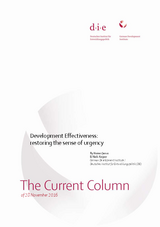The Current Column
Development Effectiveness: restoring the sense of urgency
Janus, Heiner / Niels KeijzerThe Current Column (2016)
Bonn: German Development Institute / Deutsches Institut für Entwicklungspolitik (DIE) (The Current Column of 28 November 2016)
Bonn, 28 November 2016. From 28 November until 1 December 2016, international cooperation stakeholders will gather in Nairobi for the second high-level meeting of the Global Partnership for Effective Development Cooperation (GPEDC). When considering the future of global discussion on effective development cooperation, we should start by appreciating the road it has travelled to get here. The GPEDC represents the continuation of a long process, which began as a reaction to the inefficiencies caused by established patterns of development cooperation. The aid effectiveness agenda gained traction at the UN’s Financing for Development Conference in Monterrey in 2002, and was further developed in Rome (2003), Paris (2005), and Accra (2008). The consecutive agreements gradually expanded donor commitments to better coordinate activities, improve their focus on nationally-determined priorities, and enhance efforts to assess results, while developing countries committed to taking leadership to guide donor efforts and enable innovative cooperation approaches. The Busan High-Level Forum on Aid Effectiveness in 2011 acknowledged the diversifying field of actors (e.g. South-South cooperation providers, private foundations and the private sector) and emphasized that respect for common principles could guide cooperation efforts regardless of the labels attached to various actors. Despite introducing governance reforms to accommodate its diversifying base ‘new’ actors like China and India have been reluctant to engage and did not attend the first GPEDC High-Level Meeting in Mexico City in 2014. Reflecting the loss of momentum, the development effectiveness agenda was only mentioned in a single paragraph in the outcome document of the 2015 UN Conference on Financing for Development in Addis. The Nairobi High-Level Forum provides a key opportunity for renewing commitment to the agenda and giving it the prominence it deserves. But it also needs to adjust to the multi-polar world: there is no longer one central forum to discuss aid effectiveness. Instead, the GPEDC shares the stage with relevant UN-level fora where discussions on effectiveness are taken further, as well as with various ‘mini-literal’ initiatives, such as the Sustainable Innovation Expo 2016 or efforts by EU donors to advance coordinated action. This multiplicity of international structures to discuss development effectiveness commitments carries a risk of diluting accountability. Therefore, a key mission for the GPEDC is to distinguish itself from the UN-level fora by using its – by comparison – more informal setup and act as a political driver for the international discussion. What is needed for the agenda is to be a source of constructive peer pressure among key actors, a source of debate on effective support for sustainable development - and perhaps a source of healthy controversy. Whatever will come out of Nairobi, two key elements of the original agenda should remain central: ownership as a precondition for effective cooperation, and fragmentation as perhaps the largest cause of inefficiency. First, development cooperation has to support stakeholders’ own resolve and initiative, and can only be successful when it follows their vision, priorities and timing for change. While the need for ownership is uncontested, development cooperation providers are driven by a mix of motivations, some of which may lead them to impose their political interests. One example concerns the European Union’s Emergency Trust Fund for Africa. This Trust Fund seeks to reduce ‘root causes’ that lead to irregular migration from Africa to Europe, yet ignores many of the development effectiveness principles, including ownership. Second, we witness a highly fragmented aid system with an ever increasing number of donors, other actors, as well as goals and instruments – just consider the 17 SDGs, 169 targets and 230 indicators. Critics argue that the aid system remains overly inefficient, complex and inadequate to adjust to changing international cooperation agendas. Others argue that a diverse and pluralistic aid system also brings benefits, such as greater choice over funding channels for developing countries. New research presents a nuanced picture of aid fragmentation that exists between these two extreme positions. The Nairobi meeting would fail to convince if it merely provides another opportunity to recommit to the existing principles for effective cooperation. The Nairobi meeting should be a starting point for less ceremonial, more accountable and pragmatic approaches to promoting development effectiveness. This will require a more ‘decentralised’ approach: actors may subscribe to common principles, but they may best translate these into practice by acting in smaller groups. By engaging on such a path, all actors should duly mandate the GPEDC to keep the overview and provide a means to learning and accountability, including through exposure and controversy.



